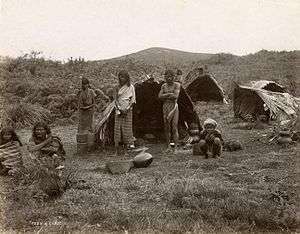Rodiya
Rodi or Rodiya are reported to be an untouchable social group or caste amongst the Sinhalese people of Sri Lanka. Their status was very similar to all the Untouchable castes of India with segregated communities, ritualised begging, eating off the refuse of upper castes and refusal for the women and men to cover their upper bodies.[1]
 A Rodi family in the 1900s | |
| Total population | |
|---|---|
| Unknown | |
| Languages | |
| Rodiya language | |
| Related ethnic groups | |
| Vedda and Kinnaraya |
The stories on the origin of the Rodi caste contradicts from text to text and are therefore far from certain. However, stories about their origin have been passed down orally by their generations. These folklore suggest their origin begins from the Sinhalese royalty. They believe they descended from the daughter of King Parakramabahu named Ratnavalli (also known as Navaratna Valli). Some of these stories are found in published documents as well. [2] According to the Janawanshaya, a palm leaf record which was written in 15th century, that explains the caste hierarchy in Sri Lanka, Rodis were not considered to be purely a low caste group. According to Kandyan law, the worst punishment for high caste nobles was the exiling them to the Rodi caste.[3] Robert Knox (sailor) and Hugh Nevill are two of the prominent writers who have mentioned about the Rodi Caste in their writings. Although these folklore tales do not provide many facts about the origins of the Rodi, they trace a connection between the daughter of King Parakramabahu and a Vedda with hunting, human sacrifice and cannibalism.[4]
See also
- Exotic Tribes of Ancient India
- Rodiya language
References
- Careem, Tuan M. Zameer.(2017). Persaudaraan (Brotherhood). Malay Life in Sri Lanka (2nd ed). Colombo: S Godage & Brothers
- Raghavan, M.D (1957). Handsome Beggars: The Rodiyas of Ceylon. Colombo: Colombo Book Center.
- Buddharakshitha, Rev. Sri (2003). Janawanshaya. Colombo: S. Godage & Brothers.
- Knox, Robert (1681). An Historical Relation Of The Island Ceylon In The East Indies. London: Printed by Richard Chiswell, Printer to the Royal Society. pp. 70–71.
Further reading
- Ratnavalli’s Children, Myth and Mystery of the Rodi by Richard Boyle
- Handsome Beggars, The Rodiyas of Ceylon. 1957 by M.D. Raghavan